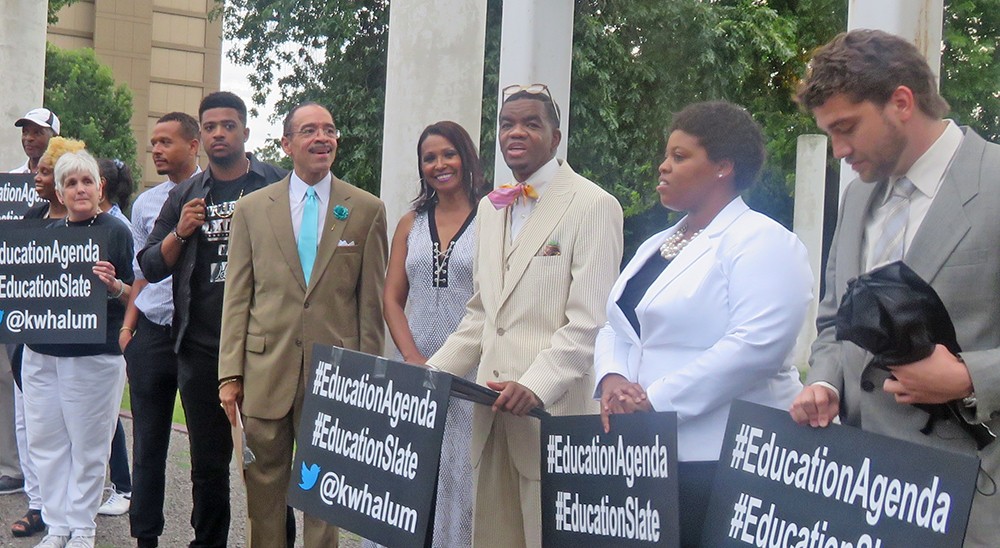 JV
JV
Whalum (in brown suit) with family members, supporters, and fellow slate members at Church Park
As expected, Kenneth Whalum Jr.’s ballyhooed late announcement of candidacy, milked for the last drop of suspense and delivered just two days before Thursday’s filing deadline at the gateway to historic Robert Church Park, shook up the race.
Only the race in question is not the one for Mayor, which is the one most people thought the intense and personable former School Board member and New Olivet Baptist Church pastor would enter. It’s the race for Super District 9, Position 2.
“I’m not stupid. There are too many people in the race [for Mayor] to defeat the status quo,” declared Whalum — flanked by supporters, family members, and, as it turned out, fellow ticket members — to a group of attendant media whose sense of anticipation had been whetted, not only by the impending announcement, but by a formidable-looking storm that was gathering over their heads, threatening to blow at any second as activist-backer Brian Clay proceeded through one of those lengthy introductions that are billed in advance as being “brief.”
Whalum would even cite the fact of the storm, and the turnout in spite of it, as proof that he had the necessary appeal to draw out supporters for his Council race in Super District 9, which, as he noted, encompasses half of the city’s voting population (and, though he didn’t note, is, like the Mayor’s race, a winner-take-all affair with no runoff).
The District 9 race would give him the opportunity, as the head of an “education slate” of like-minded Council candidates, to redress the “grievous” effects of the surrender of the Memphis City Schools charter in 2010-11, an action which he likened to the 19th Century yellow-fever epidemic in its “killing of the educational future of thousands of Memphis children.”
“To accomplish this, we must have new political leaders,” he said. To further his agenda, which was to “reclaim our children’s future by reclaiming their education,” he introduced several “slate members,” including Kristen Chers in District 4, John Marek in District 5, Keith Williams in District 3, and Anthony Anderson in District 7.
“I’m going to lead this ticket,” he said and would also endorse a mayoral candidate. But he promptly eliminated Mayor A C Wharton, as well as Councilmen Jim Strickland and Harold Collins as possible endorses, on account of their past actions in supporting school-charter surrender. He left the way open for Memphis Police association president Mike Williams but promised nothing.
Whalum said he hoped to be able to influence a majority of 7 on the newly elected Council on behalf of his education agenda. He also mentioned blight control as a major concern.
Some of the other candidates for Super District 9, Position 2, had also been active, one way or another, during this last week before the filing deadline. Whalum’s former School Board colleague Stephanie Gatewood held a fundraiser on Monday night at Acre restaurant In East Memphis, where she — as Whalum would do — promised grass root efforts that would, she said, overcome big spending by such other candidates as newcomer Philip Spinosa.
And political veteran Joe Cooper entered the week trying desperately to complete a legal process of having his right to run restored after serving time briefly for a felony conviction. Cooper and his lawyer, Steve Sauer, were working against the clock in both Chancery Court and Circuit Court to get the necessary clearance and contending that attorneys for the District Attorney General’s office were pursuing a conscience avoidance-of-hearing strategy to keep him off the ballot.
One of Cooper’s supporters in the process is state Rep. G.A. Hardaway, who said he was not endorsing Cooper’s candidacy but assisting him to overcome an injustice, one that would be rendered null and void if legislation he plans to introduce in the next session of the General Assembly is passed. That legislation would restore rights to felons upon completion of their sentences and place the burden of challenge on the state, not the newly freed prisoner.